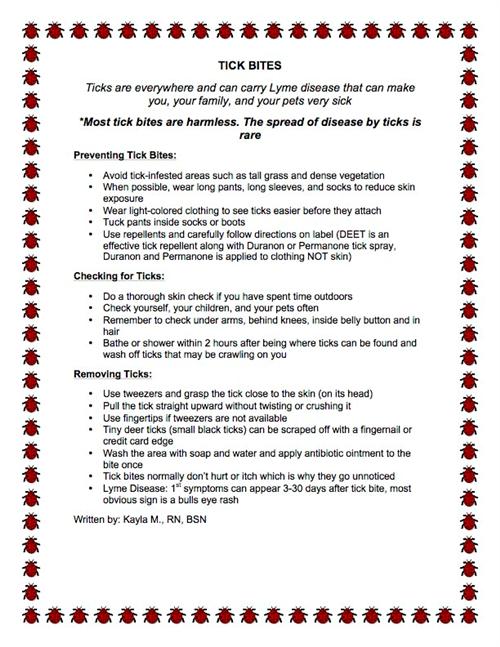-
Driscoll School Nurse: Marianne Dewing
Phone: 617-879-4257
Fax: 617-739-7502 attn: Marianne Dewing
email: marianne_dewing@psbma.orgForms:
Asthma Care Plan.pdf
Epipen Careplan.pdf
Parent Medication.pdf
Physician Medication.pdf
Seizure Care.pdfWHEN TO KEEP YOUR CHILD HOME
Parents frequently ask for guidelines for when to keep their children home with illnesses.
In general we follow these guidelines to help sick individuals recover more quickly and minimize the spread of illness. Please reinforce proper cough etiquette (into bended elbow) and hand-washing at home.
COLD (Upper Respiratory Illness): If your child has a constant runny nose and lots of sneezing and coughing, please keep your child home until these symptoms lessen, usually 24 to 48 hours. Children with mild cold symptoms may attend school.
FEVER: If your child has a temperature above 100 degrees (off medication), keep your child home until 24 hours after the temperature returns to normal of medications that reduce fevers. VOMITING AND/OR DIARRHEA: If your child has vomiting or diarrhea, keep your child home until 24 hours after the last episode.
CHICKEN POX: Vaccinated children have a small chance of having "break through" chicken pox. Notify your primary care provider if your child has chicken pox and let the school nurse know as well. For a suspected case of chicken pox, keep your child home until all the scabs are crusty and dry or there has been a medical diagnosis of another cause of the rash.
TAKING MEDICATION: When your primary care provider prescribes antibiotics for:
- Strep Throat
- Bacterial Conjunctivitis
- Impetigo
keep your child at home until s/he has taken at least 24 hours of medication. Call the school nurse before your child returns to school.
RASH: If your child has a undiagnosed rash, please see your pediatrician to say they may attend school. If your child is taking benadryl they may not attend school due to sedating effects.
SKIN FUNGUS: If your child has a skin fungus (ringworm), keep your child home and contact your primary care provider. Your child may return to school if the ringworm is small and in a covered area. For exposed ringworm, your child may return to school after 24 hours of using the recommended medication, with the affected area covered if possible.
ORAL SURGERY: Please wait to bring your child to school after oral surgery until bleeding is at a minimum, student can manage oral secretions and pain is at a tolerable level.
When calling your child absent for school, please give the specific reason for illness absenses. It helps to surveil for numbers/types of illness and subsequently impacts decisions and needs at the school.
As we spend more time outdoors, be sure to be mindful about ticks. You can learn more here: Is There a Tick on You? and below: Nurse Notes Fall 2015A few times a year, I like to check in by way of a written communication with news from the health office. You have an open invitation to be in touch with specifics for your child’s health needs at school and would strongly encourage communication, especially, if a problem arises.
Nurse Notes Fall 2015A few times a year, I like to check in by way of a written communication with news from the health office. You have an open invitation to be in touch with specifics for your child’s health needs at school and would strongly encourage communication, especially, if a problem arises.I’d like to say thank you for the prompt response for health forms and up to date immunizations. Each fall, I am required to report that all immunizations are compliant with Mass State law. It is really helpful to have a copy of your child’s most recent physical from year to year.
Thank you for keeping the school informed of illness reasons. Thus far we have had isolated cases of head lice, stomach viruses and upper respiratory illnesses. Please consider the Flu vaccine in your family and review safe practices of frequent hand washing, cough etiquette, and staying home when sick to minimize the spread of germs. I review the attendance daily to identify individual/collective data for tracking absences and illness areas.
Each year, vision and hearing screenings are done in the fall (vision: grades k-6 / hearing: grades k-3 and gr 6) Screenings are not diagnostic. You will receive a referral notice if your child does not meet the minimum standard on the screening to follow-up with a specialist. Please return the form to school when that appointment is completed. If you have seen a specialist in the past and your child has glasses, follow the recommendations of that specialist regarding follow-up.
In order to provide accommodations at school for injury, illness, concussions, a physician documentation of injury, illness, restrictions must be provided to school...
Encouraging good sleep habits, healthy eating, daily active time, limited screen time and balance of structured and unstructured social / emotional time to maintain Healthy body and mind ready to learn.
Please monitor your child’s activities of daily living. Hygiene and habits of daily care of body and hair, brushing/flossing teeth, cleaning and trimming nails, clean underclothes and socks , are habits and need to be encouraged on a regular basis until they are routine.
Please continue to be vigilant in checking your child for evidence of nits/ lice. Reminders not to share hats and personnel items for hair can help.
Keep your eyes tuned to PTO for town presentations for parenting topics.
Select a School...


